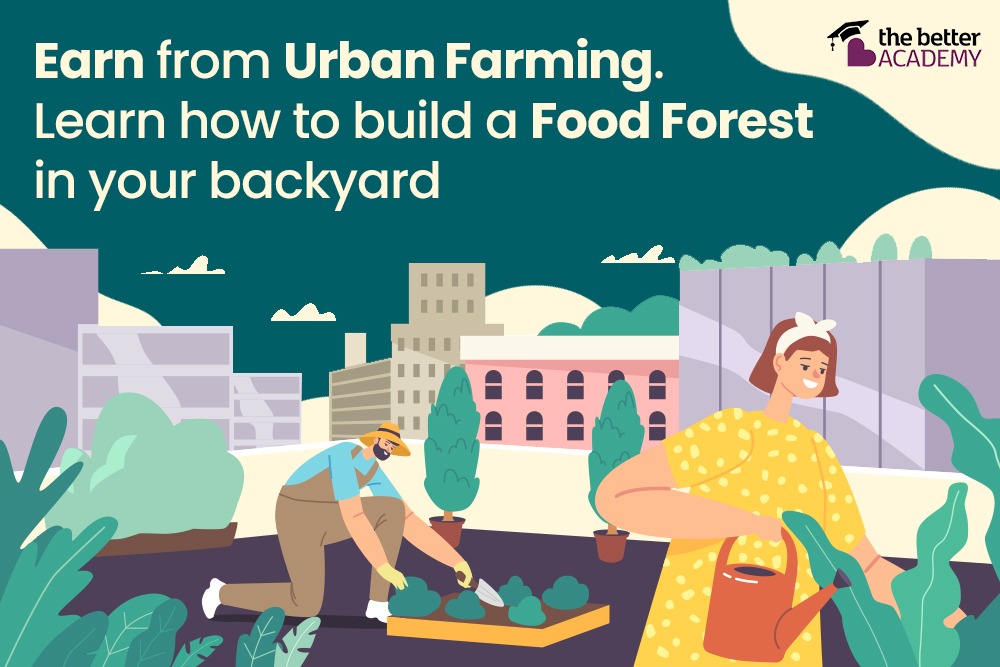Lizy John from Bengaluru has been growing all kinds of organic vegetables, spices and fruits for the past nine years on her roof.
Sounds Interesting? Share it now!
For 70-year-old Lizy John from Bengaluru, Karnataka, nurturing a lush vegetable and fruit garden on her terrace has been highly rewarding and satisfying. Without a second thought, she credits her passion for farming to be the sole reason for staying healthy and energetic even at this age.
After running a snacks business for over 25 years, she decided to retire and focus on expanding her farming venture. Though there wasn’t enough space, she says that it wasn’t a challenge at all.
“Though we have a 1,200 sqft terrace, I grow my veggies in less than 1,000 sqft, as the solar panels and water tanks consume the rest of the space. But it was more than enough for me. I admit that I am happier and at peace ever since I started growing my own food at home,” Lizy tells The Better India.
She grew up in Kerala, watching her father, a teacher and a farming enthusiast, working really hard on their farmland. This inspired her so much that despite the frequent changes in locations and residences due to her husband’s job, she always tried to grow something or the other in limited spaces.
Finally, after settling down in Bengaluru in 1998, Lizy set up her terrace garden with some basic vegetables like chillies, curry leaves, spinach and so on. It was around nine years ago that she expanded the terrace garden that now boasts almost all the vegetables and several fruit trees.
Today, she harvests around 1 kg of vegetables from her terrace garden daily, which, she says, is more than enough for the five-membered family.
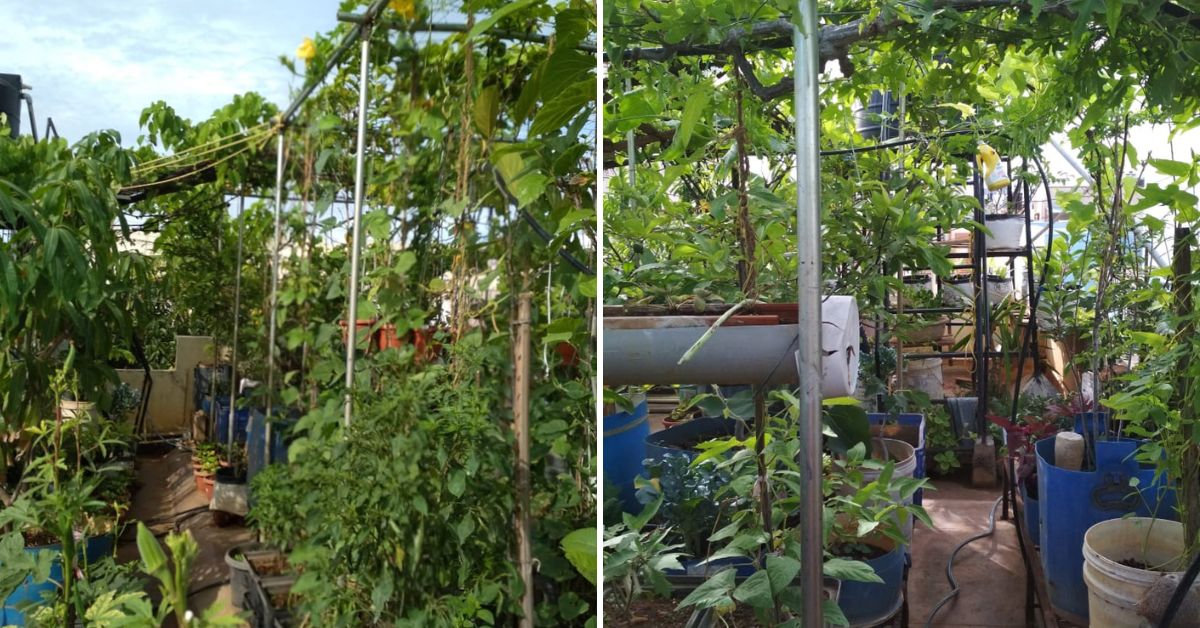
When asked about how many varieties of vegetables and fruit trees she grows, Lizy says, “The question should be — what do I not have in my garden,” she chuckles.
She proudly says, “We only rely on the market to buy onions and sometimes potatoes. The rest are available in our garden.”
“I have been growing almost all the vegetables from seasonal to exotic ones and I haven’t kept a count on the numbers. There are different varieties of each type of vegetable, spice, and herb as well as several fruit trees. Therefore, for the past several years, we have been consuming only fresh and non-toxic food harvested directly from our terrace every day,” she elaborates.
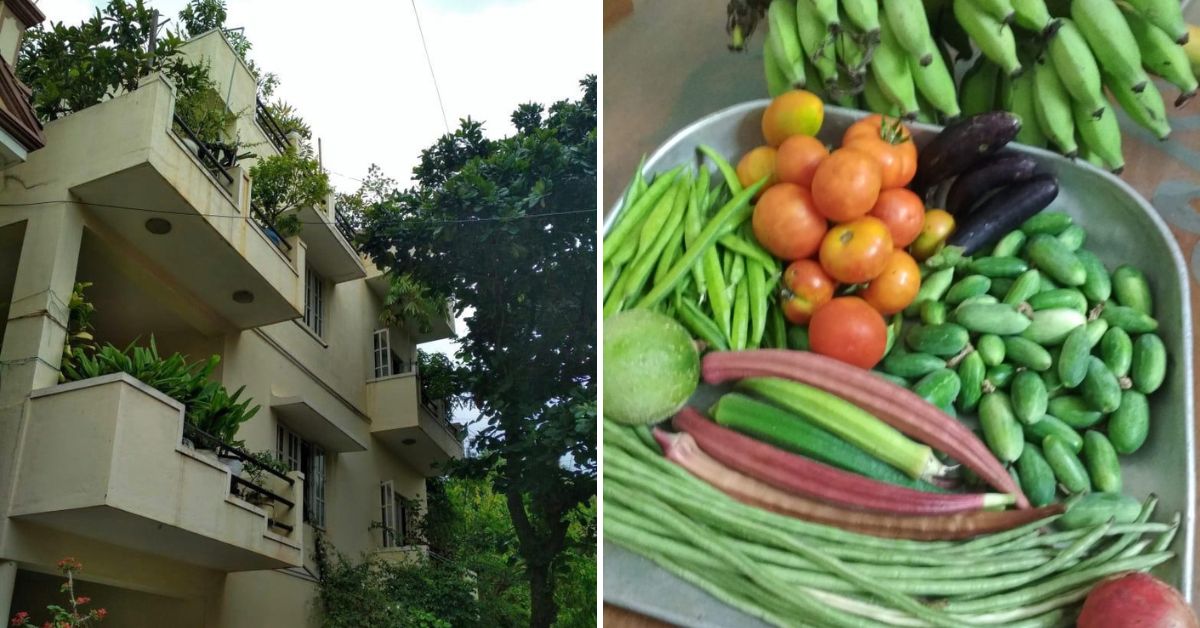
Lizy has been growing her vegetables mostly in grow bags kept on elevated stands on her terrace. Other than grow bags, she also uses plastic containers, buckets, drums, PVC pipes and even plastic bottles to grow fruit, spices, herbs and leafy greens.
“My policy is to make use of anything and everything. I never throw away plastic water bottles and instead turn them into small planters, especially for growing fruits like strawberries. Besides, I use PVC pipes to plant leafy vegetables like spinach, coriander, etc,” she says, adding that though these are her ideas, it is her husband John who has been helping her make them a reality.
“Without his help, it would’ve been impossible for me to manage. He is the one who sets up everything for me and has been constantly helping me in this venture,” she adds with a smile.
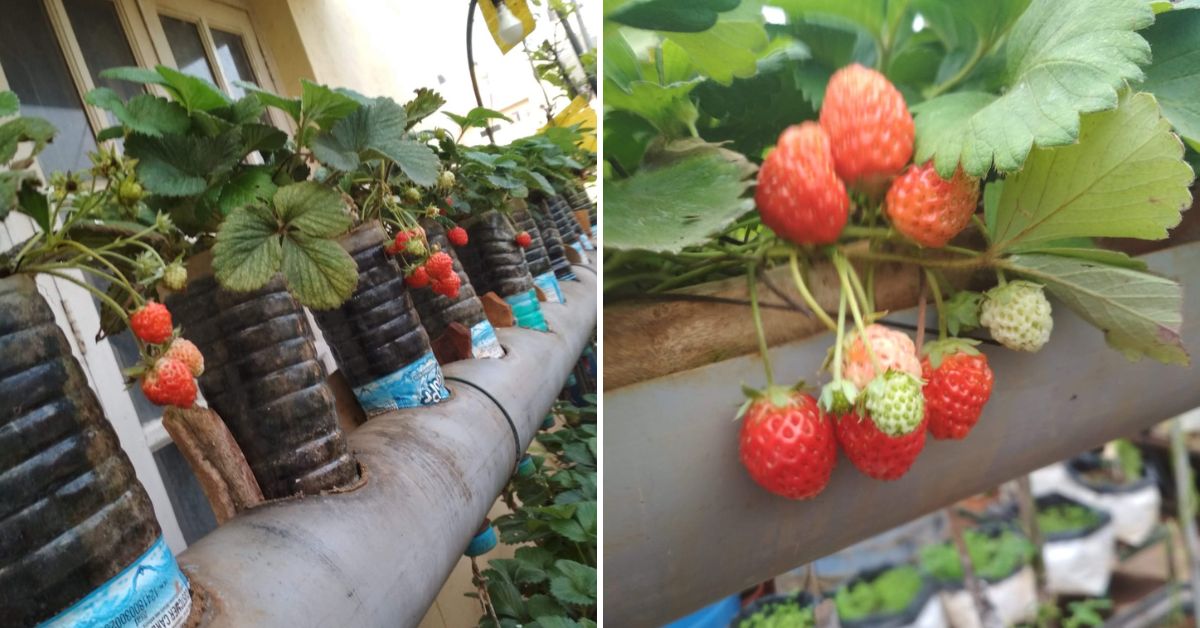
When it comes to combating pest attacks and plant diseases, Lizy says that she only uses organic fertilisers and pesticides in her garden. According to her, it has been her years-long experimentations on farming that have helped her in coming up with the best organic mixes, fertilisers and pesticides.
“Cow dung is one of the best organic manures, but being in the city, it has been often difficult to get it easily. Therefore, I have been mostly depending on organic ingredients like home compost, peanut cake, rice water, etc to nourish the soil and enhance the growth of my vegetables and fruit trees,” explains Lizy.
She uses a unique technique for a constant supply of organic fertilisers, especially for fruit trees. “I use plastic bottles and cut open its bottom. Then, fix the open mouth into the soil in the planter. Fill the bottle with the daily kitchen waste, dried leaves, etc, and add some jaggery, buttermilk, or cow dung into it. Then close the bottom of the bottle using a coconut shell. The slurry formed inside the bottle will drip into the soil, nourishing the growth of the plant,” she says, adding that she refills the mix once or twice a week.
For keeping the pests at bay, Lizy says that she uses an array of measures. One is the usage of yellow trap which, according to her, helps in keeping certain pests at bay. “Other than that, I make a mix using 5 ml of neem oil in one litre of water and add some soap or detergent. Spraying this mix onto plants once in a while would resist pest attacks. One can also ferment rice water, dilute it in water, and spray it onto the plant,” she adds.
Lizy says that she treats her soil well before planting anything. “For that, I mix soil with lime and dry it,” says Lizy who always makes sure that she buys only good quality seeds and saplings.
“I buy vegetable seeds/saplings through people I know or through trusted farming groups on social media. Also, when it comes to fruit trees, I collect the saplings from different places I travel to,” she says.
Different varieties of tomatoes, brinjal, peas, okra, beans, spinach, chillies, bitter gourd, chow chow, air potatoes, cucumber, drumstick, potatoes, broccoli, cauliflower, celery and so on are a few among the long list of vegetables that Lizy grows on her terrace.
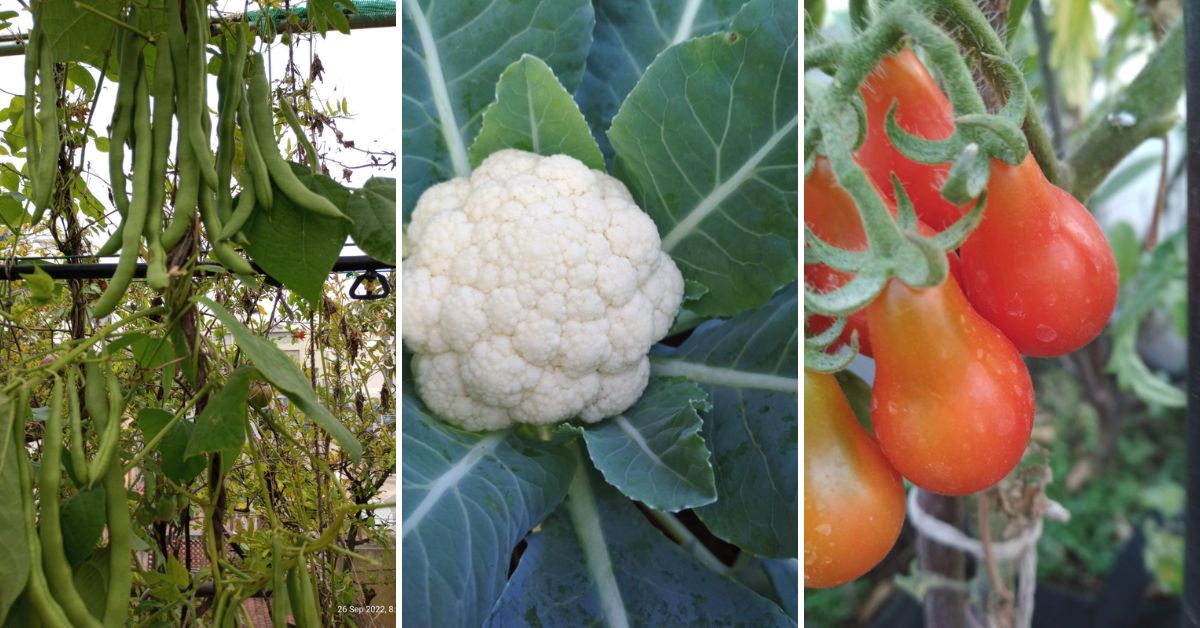
She also grows spices like pepper, turmeric, ginger, pippali (long pepper), and even cardamom.
One of the major highlights of her terrace garden is the collection of strawberries which are mostly grown in water bottles or on PVC pipes. Other than strawberries, guavas, pomegranates, mangoes, jamuns, grapes, custard apples, water apples, western cherry, avocado, dragon fruits, oranges, blackberries, mulberries, etc. are some of the other fruits on her terrace.
Lizy has won several awards and accolades for her terrace gardening venture from different organisations in Kerala and Karnataka. “I have so far received around 15 awards including the Sarojini Damodaran foundation’s award, Haritha Keralam award, Hope Charitable Trust award and the Mathrubhumi award,” she adds.
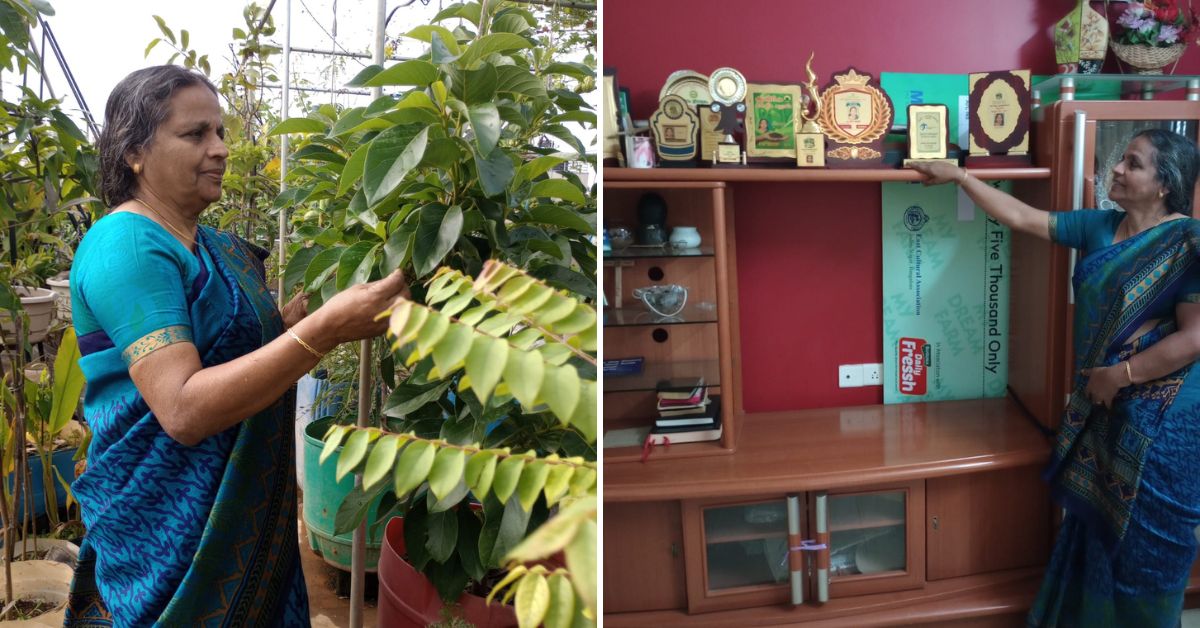
She says that with a lot of hard work and a little patience, anyone can grow their food even in limited spaces. “Even if it is just a chilli plant when it flowers or bears its first fruit, it gives us a kind of happiness and satisfaction. It keeps me going, and though it is challenging, growing one’s own food is highly rewarding in terms of health,” she says with a smile.
Edited by Yoshita Rao
Sounds Interesting? Share it now!
We at The Better India want to showcase everything that is working in this country. By using the power of constructive journalism, we want to change India – one story at a time. If you read us, like us and want this positive movement to grow, then do consider supporting us via the following buttons.
Please read these FAQs before contributing.
Get your daily dose of uplifting stories, positive impact, and updates delivered straight into your inbox.
[email protected]
[email protected]
right here!
